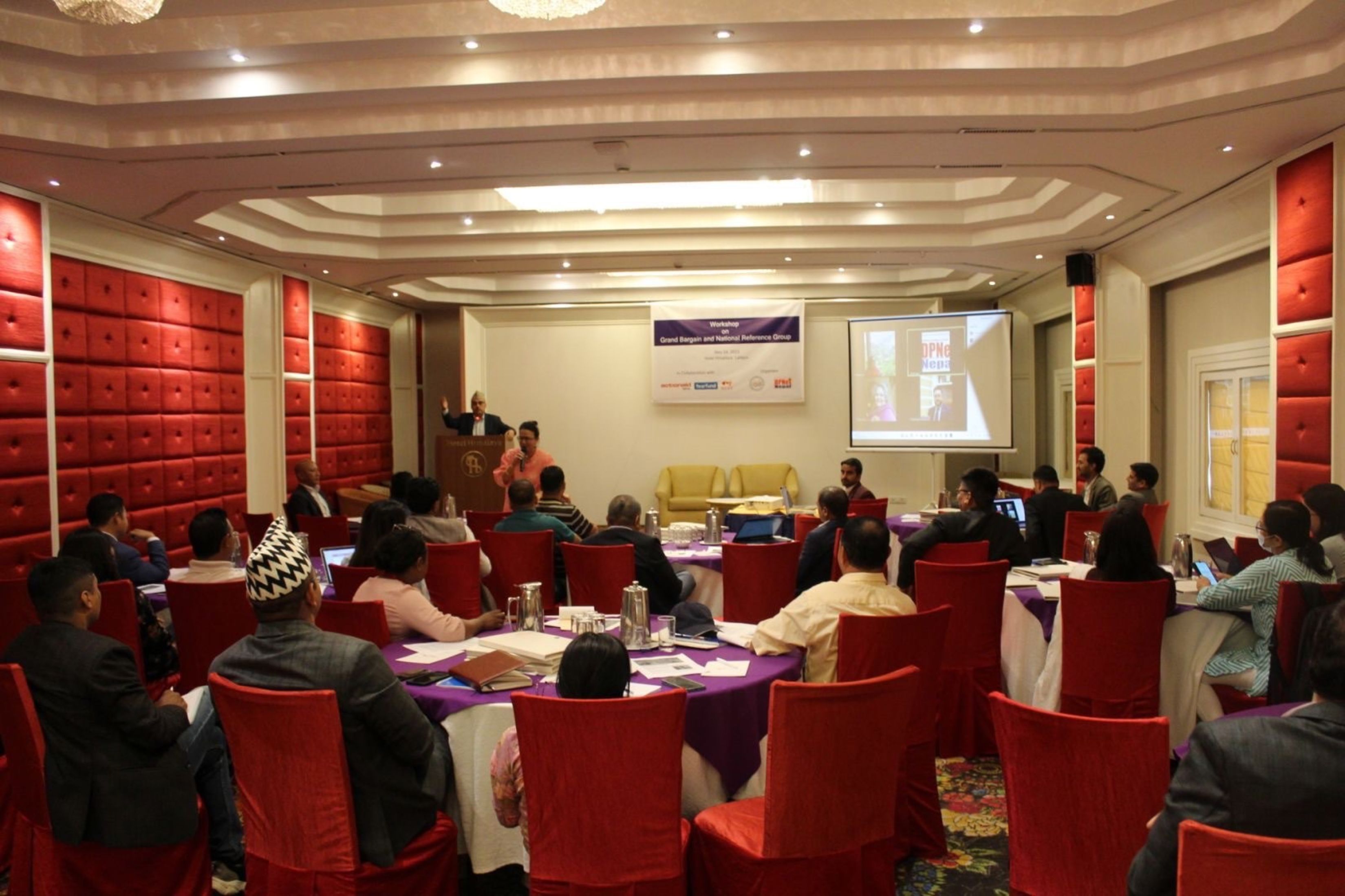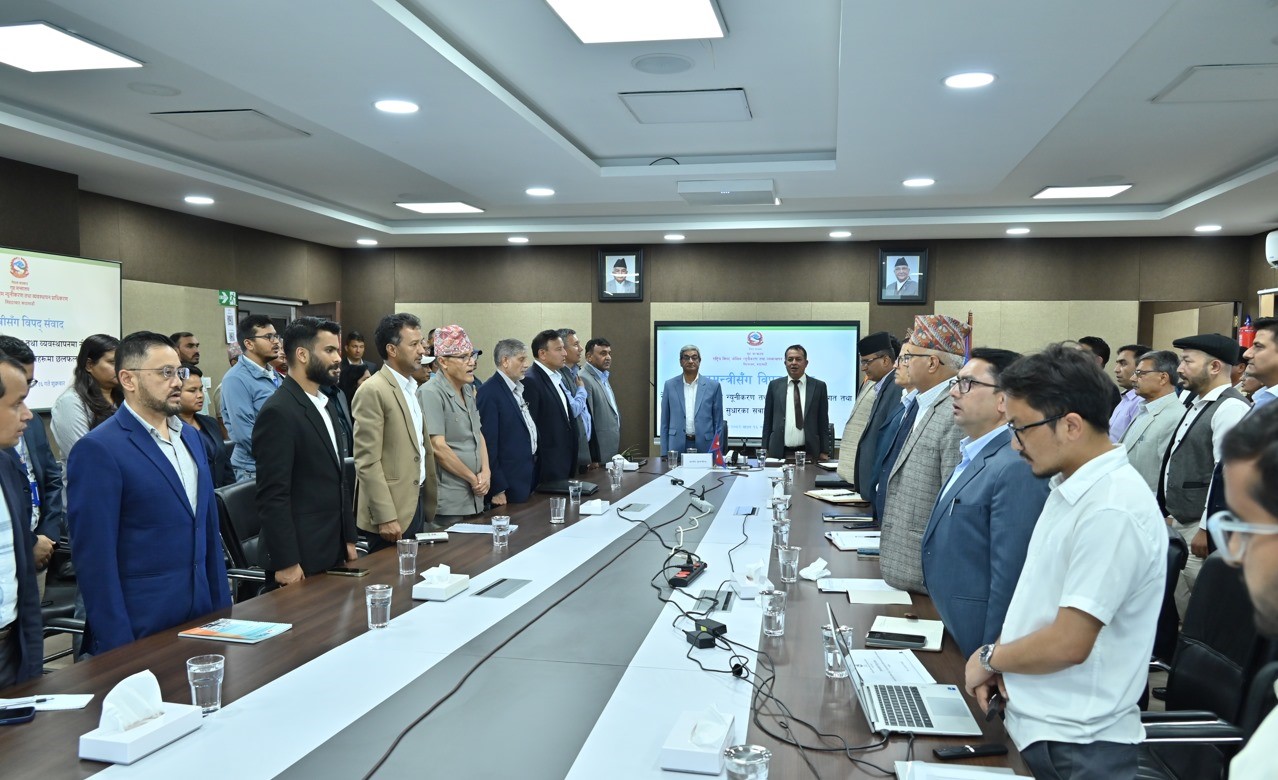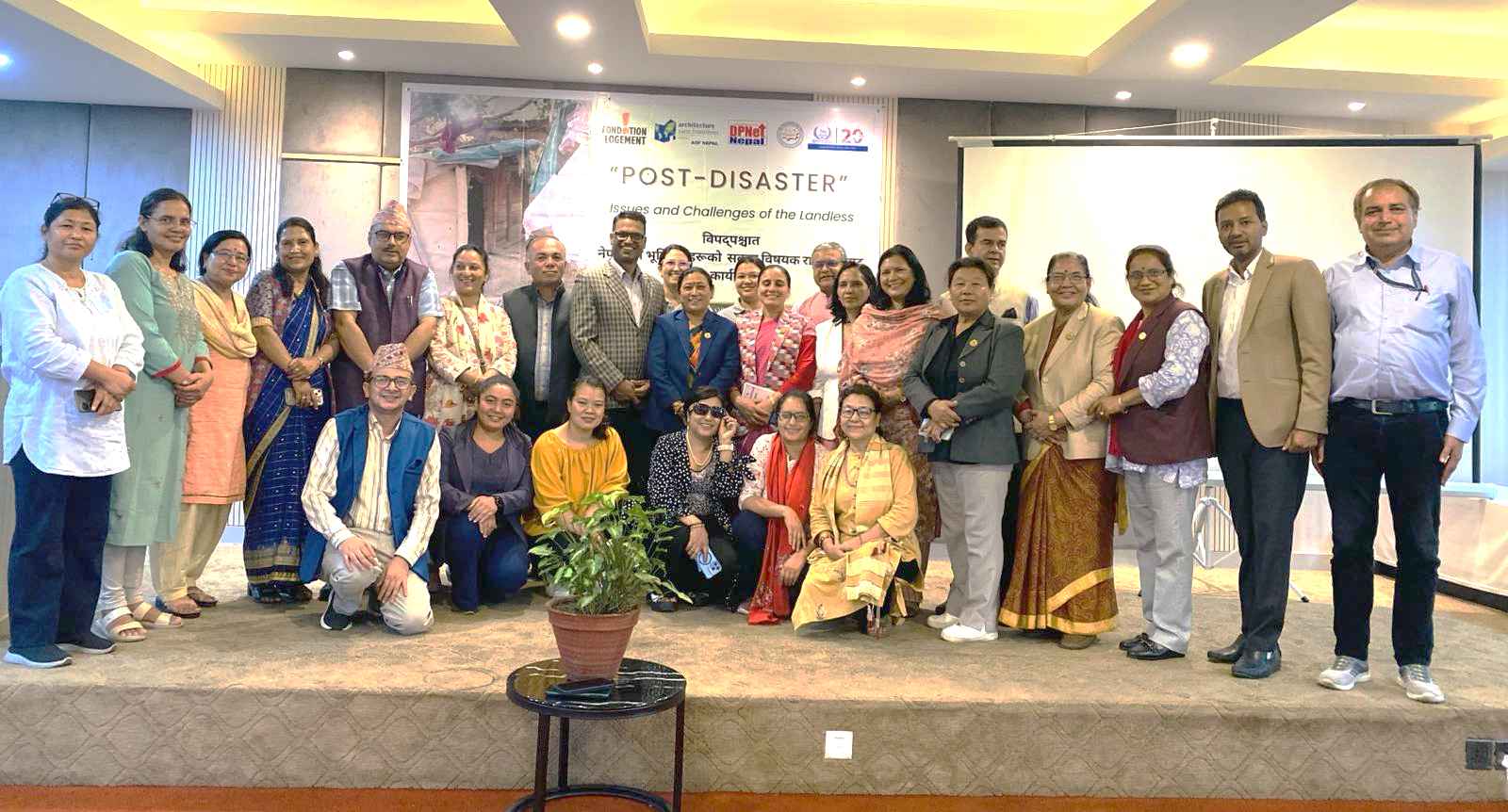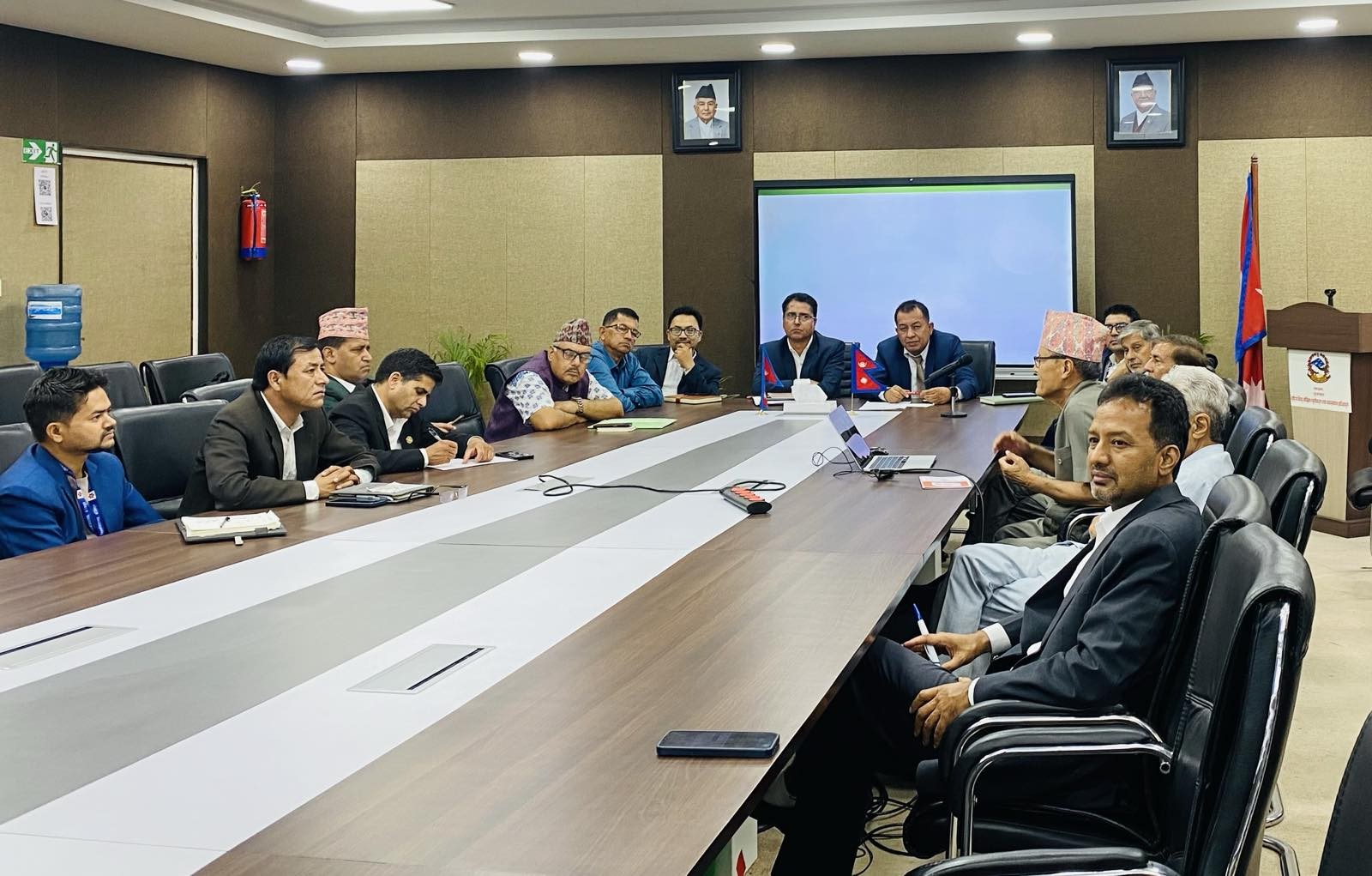Workshop Held on Grand Bargain and National Reference Group in Nepal

LALITPUR, NEPAL - A historic workshop concerning the Grand Bargain and the establishment of a National Reference Group (NRG) was held on May 24, 2023, in Lalitpur. This event was facilitated by DPNet and DiMaNN, partnering with ActionAid Nepal, Tearfund, and NEAR. The workshop was charied by Mr. Surya Bahadur Thapa, Chairperson of DPNet and DiMaNN. Sujeeta Mathema from ActionAid stressed the need for disaster management, and called for the inclusion of women in leadership roles. Mr. Pratap Maharjan of ActionAid emphasized the importance of involving women's groups in humanitarian efforts in his report, "Bargaining for Better". Ms. Shahida Arif from NEAR emphasized the value of local leaders in crafting effective response strategies. Mr. Hasta Bahadur Sunar from Tearfund shed light on the achievements of the Grand Bargain. Sharing the feedback received from DPNet's virtual discussion platform Dr. Raju Thapa suggested a crucial need for improved transparency, efficiency, and community involvement in disaster aid management. Mr. Surya Narayan Shrestha from NEAR explained its origins and structure, highlighting the future role of the NRG in translating global commitments into local action.
The workshop concluded with the decision to form a National Reference Group, comprising nine members from organizations DPNet Nepal, DiMaNN, NGO Federation, NFDN, RDN, WFDA/FEDO, NSET/NEAR, ActionAid, and Tearfund. DPNet was appointed as the coordinator of this committee, overseeing its activities and playing a critical role in developing the NRG. The committee will focus on coordinating various initiatives and activities, and devising the Terms of Reference (ToR) and future plans for the NRG. This workshop accentuated the collective vision of enhancing the effectiveness and efficiency of humanitarian aid, promoting collective bargaining power, local leadership, and inclusivity in all humanitarian actions.
News in Details:
LALITPUR, NEPAL - On 24 May 2023, a thought-provoking workshop on the Grand Bargain and National Reference Group took place at Hotel Himalaya, Lalitpur. The event was organized by the Disaster Preparedness Network Nepal (DPNet) and the National Disaster Management Network of Nepal (DiMaNN) in collaboration with Action Aid Nepal, Tearfund, and NEAR (Network for Empowered Aid Response). The workshop commenced by chairing the session and inspiring a welcome note by Mr. Surya Bahadur Thapa, the Chairperson of DPNet and DiMaNN.
Dr. Daya Sagar Shrestha of DiMaNN, MC of the program highlighted the event objectives and highlighted the pressing need of t National Reference Group in Nepal to make the humanitarian aid system more efficient and cost-effective, especially from the lenses of administrative cost.
Ms. Sujeeta Mathema, Executive Director, ActionAid, emphasized several key points regarding "Bhavya Samjhauta" (the Grand Bargain) and its relevance to effective humanitarian response, disaster management, and preparedness. She stressed the non-negotiable priority of prioritizing disaster management and preparedness in light of the increasing occurrence of crises like landslides and floods. Mathema called for a scrutinization of the commitment shown by countries that have signed the Grand Bargain, considering the magnitude of the challenges at hand. She also underscored the importance of understanding the impact of disasters, emphasizing the need for efficient preparedness to alleviate distress, stress, and anxiety, and to build resilience. Another significant aspect highlighted by Ms. Mathema was the respectful distribution and planning of assistance, ensuring that affected communities' needs and rights are respected. She emphasized the need to acknowledge and involve women's leadership in disaster management, as their perspectives can provide valuable insights into the effectiveness and relevance of assistance. Additionally, Ms. Mathema emphasized the importance of accountability, transparency, and de-politicization in disaster management processes to build trust and ensure the efficient allocation of resources. She highlighted the significance of shifting power and resources to local actors and communities for sustainable disaster management and response. Lastly, Ms. Mathema looked forward to the next workshop as an opportunity to establish a clear national position on disaster management, aligning it with both national and global perspectives.
Addressing virtually Ms. Shahida Arif, NEAR's regional representative for Asia and the Pacific, expressed her support and emphasized the global significance of the issue at hand. When discussing localization, it is essential to recognize the broader context and the potential for accelerated progress through investments in humanitarian efforts. Ms. Arif highlighted the critical importance of valuing the perspectives of local leaders, as their insights are invaluable for shaping effective response strategies. To facilitate meaningful progress, it is imperative to allocate adequate time and attention to listen attentively to their viewpoints.
Followed by an extensive report on "Bargaining for Better" presented by Mr. Pratap Maharjan of Action Aid Nepal. Mr. Maharjan highlighted the need for more meaningful inclusion of women's groups in the Grand Bargain 2.0, an international humanitarian aid agreement. The report revealed the Grand Bargain has not been able to shift power, resources, and decision-making to local actors, in particular, Women's Rights Organizations (WROs) and Women-led Organizations (WLOs). He noted that the Grand Bargain's current framework inadequately addresses gender equality and the empowerment of women and girls (GEEWG). Based on literature and qualitative survey data from ActionAid's WRO and WLO partners across 10 countries, Mr. Maharjan reported that 64% of survey respondents were uncertain whether their voices and opinions were heard or acted upon within the Grand Bargain. This lack of transparency and inclusion has led to a perception that the Grand Bargain remains 'gender-neutral'. Mr. Maharjan also highlighted that less than 1% of aid from top humanitarian donors was allocated to fragile states and directly to WROs and WLOs in 2020. WROs and WLOs also face challenges accessing pooled funds, such as the Women’s Peace and Humanitarian Fund.
In response to these findings, Mr. Maharjan called on Grand Bargain signatories, including donors, UN agencies, and international NGOs, to enable meaningful engagement of WROs and WLOs, increase the amount and quality of humanitarian funding that goes to these groups, and review risk mitigation policies. He also urged these bodies to ensure WROs and WLOs have the resources they need to engage in leadership roles and to reevaluate their approach to partnering with local actors. Mr. Maharjan's presentation underscores the demanding need for a feminist lens in the design and implementation of international humanitarian aid, starting with the Grand Bargain 2.0.
Mr. Hast Bahadur Sunar, Public Policy Adviser at Tearfund, delivered a presentation regarding the international humanitarian aid framework, the Grand Bargain, focusing on the context of Nepal. One of the key points raised in his presentation was the impressive efficiency savings realized through the Grand Bargain between 2016 and 2021. Initially, the expected savings through efficiency measures over the five-year period were estimated at USD 1 billion. However, quoting one of the sources, Mr. Sunar presented that the actual savings have far exceeded this estimate, amounting to approximately USD 4 billion.
Mr. Sunar opined that the localization process currently happening at the global level could possibly be attributed to, for the differential savings between the expected and actual figures underscores the effectiveness of the Grand Bargain in streamlining international humanitarian aid. He presented some more pertinent facts and figures around the need and urgency to deliver Grand Bargain and localisation commitments for the effective and efficient humanitarian response. The funding size and shortfall to respond to global humanitarian needs as presented in the figures depicted that the needs are widespread, the financing gap is huge to be able to address the needs and therefore, the need to improve the way the global humanitarian system operates is an urgent call.
Part of Mr. Sunar’s presentation focused on the need to build on what’s already in place in regards to the Grand Bargain and Localisation process – achieved through the Accelerating Localisation through Partnerships Programme, among others, earlier in Nepal. He advised to refer to some pertinent research references around how the process of localisation could be advanced and accelerated in Nepal, and also, guided through the discussion regarding what needs to be initiated based on the learning from the past. The Grand Bargain and localisation journey so far and next steps in the specific context of Nepal were presented as suggestive actions for the National Reference Group to be established vis-à-vis the global GB 2.0 context for Nepal.
Mr. Surya Narayan Shrestha, Leadership Council Member of NEAR and Executive Director of NSET, delivered a detailed presentation on making aid more effective and efficient, discussing the origins and structure of the Grand Bargain, a humanitarian financing initiative. The Grand Bargain was proposed by a UN panel to address the growing gap between humanitarian needs and available resources. Launched at the World Humanitarian Summit in 2016, it is an agreement between major donors and aid organizations to improve the effectiveness of humanitarian action. Its commitments include investments in preparedness, risk reduction, and mitigation, alongside measures to broaden the base for humanitarian action. The Grand Bargain, while not binding, encourages organizations and donors to commit to transparency, collaboration, and continuous improvement in their humanitarian efforts. It is structured around 51 commitments organized into eight thematic work streams, each focusing on a specific aspect of aid effectiveness, from greater transparency to simplified reporting requirements. In 2021, the signatories endorsed the Grand Bargain 2.0 framework, which revised the structure and introduced new elements like the National Reference Groups and Caucuses. These aim to translate global commitments into meaningful change at the national level and ensure effective humanitarian response.
Mr. Shrestha highlighted ongoing efforts in Nepal to establish a National Reference Group, an inclusive local body of humanitarian actors, to better address humanitarian needs. He also discussed the Grand Bargain's future, noting that the concept of the National Reference Group would continue in the larger context of the Local Leadership Lab being launched by NEAR. Mr. Shrestha ended his presentation by highlighting the monitoring implementation process and the possibility of new signatories joining the Grand Bargain. He concluded with a look ahead to the Grand Bargain Annual Meeting set for June 19-20, 2023 in Geneva, where the progress of Grand Bargain 2.0 will be reviewed, and the next phase of the initiative will be launched.
Feedback received from DPNet's virtual discussion platform in Nepal suggests a crucial need for improved transparency, efficiency, and community involvement in disaster aid management, according to Dr. Raju Thapa. The virtual discussion focused on the Grand Bargain, an agreement struck in 2016 aiming to streamline the humanitarian aid system. As the Grand Bargain 2.0 commences, conversations are underway to maximize its benefits and understand its relevance in Nepal. Participants emphasized the importance of the Grand Bargain, citing its potential to reduce administrative costs and enhance efficiency in humanitarian assistance. However, concerns were raised about the slow disbursement of aid, high administrative costs, politics involved in aid distribution, and an overall lack of transparency in resource allocation. One significant point of discussion revolved around the need for better community involvement in disaster management. Suggestions were made to strengthen community institutions, incorporate affected communities in decision-making processes, and directly invest in communities for future disaster preparedness. On the issue of humanitarian values and ethical considerations, participants criticized individuals who appear to use aid distribution for self-promotion and emphasized the importance of a selfless and effective approach to aid rooted in human moral values, honor, and dignity. Equity and proportionality in aid distribution were also identified as areas needing attention. Participants called for greater consideration of contextual factors in aid distribution, along with the potential role of the National Reference Group (NRG) in ensuring diverse stakeholder representation and inclusivity. The feedback highlighted the importance of the NRG as a coordination mechanism for local and national stakeholders, ensuring transparency and amplifying the voice of the affected population. Urgent action to establish the NRG in Nepal was called for, with Disaster Preparedness Network Nepal (DPNet) suggested as a potential interim coordinator. Dr. Thapa's presentation underscores the need for enhanced collaboration, transparency, and community involvement in disaster aid management, elements that will be crucial in realizing the goals of the Grand Bargain 2.0 in Nepal.
In his special remarks, Prof. Dr. Hari Darshan Shrestha, a founding member of NEAR and a member of its first leadership council, highlighted several important points related to conflict, organizational accountability, and the role of local organizations in humanitarian efforts. He emphasized the need for transparency, the absence of corruption, and the importance of documented evidence to support these claims. Prof. Dr. Shrestha called for a simplified funding structure that would enable direct support to local organizations and reduce administrative costs. Recognizing the significance of building the capacity of local organizations, he stressed the need for continuous capacity-building processes, especially for organizations focused on response activities.
Prof. Dr. Shrestha discussed NEAR as a global advocacy group and acknowledged the challenges faced during its establishment. He expressed the view that new entities are unnecessary and suggested that NEAR should operate solely as an advocacy group. Prof. Dr. Shrestha also highlighted the work of Degan Ali, a prominent figure in decolonizing development aid and rethinking humanitarianism. Degan played a pivotal role in developing the concept of a global south civil society network and co-founded NEAR in 2016. Degan's advocacy for the localization movement and the Grand Bargain's target of allocating 25% of funding to local actors was emphasized. Regarding NEAR's independence, Prof. Dr. Shrestha proposed that DPNet could facilitate its functioning while ensuring independence, as governmental ownership might limit effective advocacy. He shared his experiences in establishing networks and emphasized the importance of building capacity and preserving institutional knowledge. He stressed the need for local and community-centric approaches, acknowledging the unique thoughts, cultures, and practices of different places and communities. As a member of NEAR, Prof. Dr. Shrestha recognized the importance of including community representatives to ensure their voices are heard. He advocated for community participation within the National Representation Group to better understand local contexts, needs, and capacities. In conclusion, he emphasized the need to prioritize the well-being of affected people in all humanitarian efforts and initiatives.
During the open discussion session at the workshop, participants addressed various issues within different thematic areas. The evolution and impact of the Grand Bargain were explored, covering its origins, structure, revisions, efficiency savings, and challenges. Transparency, efficiency, and ethics in humanitarian aid were also discussed, including concerns about high administrative costs, slow disbursement, and the role of politics and private companies in aid distribution. The importance of empowering and involving local organizations and actors in disaster management and community level awareness was emphasized, highlighting the need for direct investment, incorporation of cultural and social aspects, and the role of Women's Rights Organizations (WROs) and Women-led Organizations (WLOs). Inclusion, equity, and proportionality in aid distribution were raised as important considerations, emphasizing diverse stakeholder representation and contextual factors. The role of national and local coordination mechanisms, such as the National Reference Group (NRG), collaboration with the National Platform for Disaster Risk Reduction (NPDRR), and the interim coordination role of the Disaster Preparedness Network Nepal (DPNet), were discussed. Lastly, the workshop addressed the incorporation of gender and social inclusion considerations in aid management, emphasizing the Grand Bargain's approach to gender equality, criticism of being gender-neutral,' and the significance of Gender Equality, Disability, and Social Inclusion (GEDSI) considerations.
The workshop concluded with the decision to form a National Reference Group, comprising nine members from organizations DPNet Nepal, DiMaNN, NGO Federation, NFDN, RDN, WFDA/FEDO, NSET/NEAR, ActionAid, and Tearfund. DPNet was appointed as the coordinator of this committee, overseeing its activities and playing a critical role in developing the NRG. The committee will focus on coordinating various initiatives and activities, and devising the Terms of Reference (ToR) and future plans for the NRG. The primary objectives of the committee will be to coordinate various initiatives and activities, as well as develop the Terms of Reference (ToR) and future plans for the National Reference Group (NRG).
The workshop, recognized as the inaugural historic event of its kind, received acknowledgment from the program chair, Mr. Surya Bahadur Thapa, who proclaimed it a resonant success. Mr. Thapa provided a comprehensive summary and expressed his gratitude. He emphasized several important points, starting with the need to prioritize marginalized groups who are vulnerable. He called for further discussions on how signatory countries are implementing the Grand Bargain and highlighted the valuable insights that NGOs working on the ground can contribute to this dialogue. Effective delivery of services was emphasized as a crucial aspect. Mr. Thapa also underscored the significance of National Reference Groups for self-criticism and monitoring. Acknowledging the challenges faced by local organizations in integrating and accessing resources due to insufficient funds, he stressed the importance of collective approaches to enhance bargaining power for better service delivery. The increasing occurrence of disasters was also noted as a pressing concern. Additionally, Mr. Thapa reiterated the need to focus on marginalized groups, the discussions around signatory countries' efforts on the Grand Bargain, and the valuable insights from NGOs working on the ground.
Finally, Chair Thapa emphasized that the workshop effectively showcased the unwavering dedication of all the stakeholders involved in bolstering the Grand Bargain and National Reference Group's endeavors in Nepal. Mr. Thapa expressed his gratitude, concluding the session on a positive note. The event provided valuable insights and discussions on various important aspects, emphasizing the need for research to assess the status of local organizations after project completion and the importance of ensuring their functionality for successful capacity-building efforts.
Please click the following links to access the presentations delivered during the workshop:
Bargaining For Future Bringing a Feminist Lens to Grand Bargain 2.0
Grand Bargain and Localization Discourse in Nepal
Feedback Received from Virtual Discussion Platform
Overview of Grand Bargain: How aid can be made effective and efficient











